Leviathan Blu-ray Movie
HomeLeviathan Blu-ray Movie 
Cinema Guild | 2012 | 98 min | Not rated | Oct 22, 2013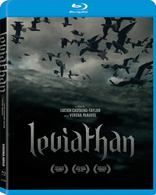
Movie rating
6.5 | / 10 |
Blu-ray rating
| Users | 1.8 | |
| Reviewer | 4.0 | |
| Overall | 3.6 |
Overview
Leviathan (2012)
In the very waters where Melville's Pequod gave chase to Moby Dick, Leviathan captures the collaborative clash of man, nature, and machine. Shot on a dozen cameras — tossed and tethered, passed from fisherman to filmmaker — this is a cosmic portrait of commercial fishing as it's never been seen.
Starring: Brian Jannelle, Adrian Guillette, Arthur Smith (XXXIV), Asterias Vulgaris, Callinectes SapidusDirector: Lucien Castaing-Taylor, Verena Paravel
| Documentary | 100% |
Specifications
Video
Video codec: MPEG-4 AVC
Video resolution: 1080p
Aspect ratio: 1.78:1
Original aspect ratio: 1.78:1
Audio
English: DTS-HD Master Audio 5.1
Subtitles
None
Discs
50GB Blu-ray Disc
Single disc (1 BD)
Playback
Region free
Review
Rating summary
| Movie | 4.5 | |
| Video | 4.5 | |
| Audio | 4.5 | |
| Extras | 2.0 | |
| Overall | 4.0 |
Leviathan Blu-ray Movie Review
"Behold, the hope of him is in vain: shall not one be cast down even at the sight of him?"
Reviewed by Casey Broadwater October 19, 2013The biblical Leviathan, a sea monster who appears most prominently in the book of Job, has been a potent, mutable symbol, used for various purposes in literature and theology throughout the ages. In Job chapter 41, the beast is presented as a creature second in strength only to God himself; the passage—in which God declares, "None is so fierce that dare stir him up: who then is able to stand before me?"—serves to humble prideful mankind. In the Middle Ages, the Leviathan conjured up images of Satan and Hell, and in the seventeenth century, Thomas Hobbes used Leviathan as the title of his opus on nascent political science, comparing the all-powerful creature to his conception of an ideal state ruled by an absolutely sovereign monarch with the consent of the people. Of course, in Herman Melville's Moby Dick, Captain Ahab's own personal leviathan—the elusive white whale—is invested with a multitude of meanings, from man's desire to conquer nature to the mystery and unknowability of the divine.
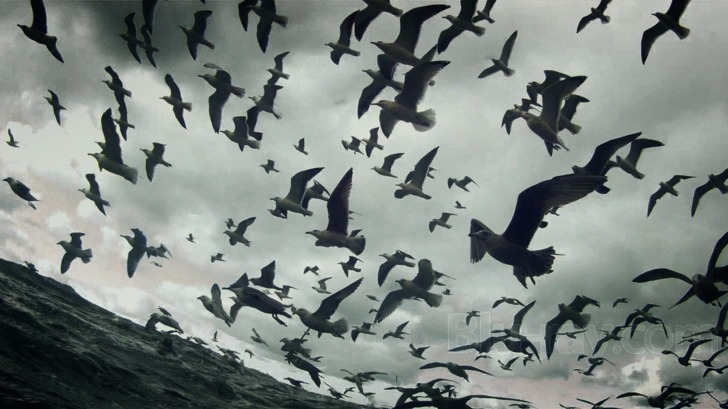
And here we have a new Leviathan, a documentary-of-sorts set in the very waters off the New England coast where Captain Ahab of the Pequod once fictively sought his quarry. I say "of-sorts" because the film is both more and less than a conventional documentary. There are no talking heads. No narration. No sense of being a cinematic essay out to make a particular point. This Leviathan is visual poetry above all else—pure cinema—stripped to haiku-like simplicity and endlessly evocative. To understand what the film is going for, it's probably helpful to know that it was made by French anthropologist/filmmaker Verana Paravel and Lucien Castaing-Taylor (Sweetgrass), the latter a professor at Harvard University's acclaimed Sensory Ethnography Lab. The interdisciplinary center's mission statement is to "support innovative combinations of aesthetics and ethnography that deploy original media practices to explore the bodily praxis and affective fabric of human and animal existence, and the aesthetics and ontology of the natural world." That is, to explore being, not from a strictly philosophical vantage point, but through the direct experience of reality.
Superficially, we might say that Leviathan is about what goes on—the processes, the slaughter, the hard and messy work—aboard an 80-foot commercial fishing ship in the North Atlantic. But that's just as reductive as saying Moby Dick is "about" a guy obsessed with spearing a whale. In simply observing life and death on this vessel, without commentary, the film opens itself wide to interpretation, suggesting everything or nothing depending on your own willingness to participate and find meaning in the material.
It's highly subjective by design, down to the first-person point-of-view cinematography. Leviathan was shot with small, waterproof GoPro action-cameras mounted on the ends of boom poles, up in the ship's crow's nest, on the outside of the hull, but mostly on the chests of the fishermen themselves, giving us an often harrowingly intimate perspective. The first twenty minutes of the film play out in what appears to be a single, uncut shot looking out from the body of one of these men in real-time as he assists his crewmates in winching a net out of the inky nighttime water and dumping its haul of thousands of fish into a wooden enclosure on deck that's soon to be covered in blood.
There's more gore here than in the grisliest horror films. We watch as the men gut the fish with ultra-sharp filet knives, lop off heads that fall gaping and wide-eyed to the viscera-strewn deck, and work in tandem with a machete to lop the "wings" off of still-living stingrays. (To paint an arguably unneeded clearer picture: Two men pierce the flaps on either side with meathooks, spreading them wide, before one of the men takes his blade and separates each wing from the body in three firm hacks.) More than once, a camera will just float amid the swirling mass of carcasses in a red-watered tank. Later, after the fish have been cleaned and stored in the hull, this crimson effluence—filled with fleshy bits and intestines and starfish unlucky enough to have been scooped up—is dumped overboard, a feast for the scores of seagulls swarming overhead.
The film is disturbing in how matter-of-factly it shows all of this, and to some extent it belongs in the semi-prolific sub-genre of "abattoir" documentaries concerned with the cruel slaughter of animals. But Leviathan, like Georges Franju's Le sang des bêtes—Blood of the Beasts, one of the earliest films of this kind—is less a single-minded advocation of vegetarianism than a sly, almost darkly comic way to confront us with the absurdity and horror of our own corporal existence. The film neatly slices away the privilege and status we assume we have as humans and reminds us that we too are short-lived, material creatures that the unfeeling universe will inevitably turn to chum. In a sense, then, Leviathan itself is the humbling beast of Job 41, forcing us to acknowledge our weakness and impermanence, but this is only one possible subtext in a film swift with thematic undercurrents. Is Leviathan an indictment of modern commercial fishing's exploitation of the sea? Is it a tone poem on the mythic theme of man versus nature? Is it a simple portrayal of the tedium and danger of this profession? Yes, sure, yes, and more.
Leviathan Blu-ray Movie, Video Quality 
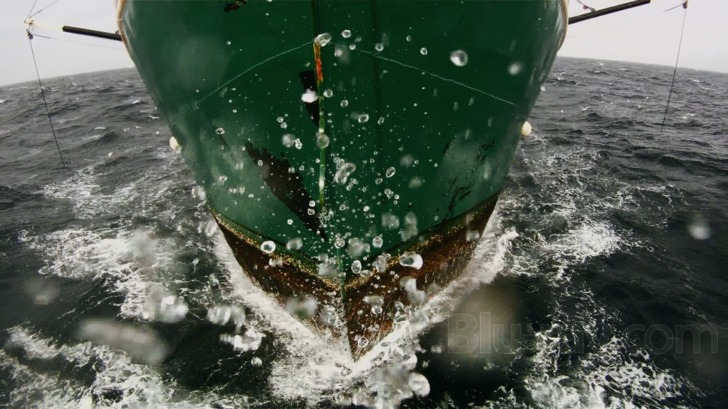
It's impossible to judge Leviathan's picture quality by any of the normal rubrics. When Lucien Castaing-Taylor and Verana Paravel set out on their documentary voyage, they almost immediately lost their larger, more professional digital camera to the sea, forcing them to use their backup array of tiny GoPro action-cams, the sort favored by "extreme" surfers and mountain-bikers and kayakers. Waterproof and easily body-mountable, the GoPro is ideal for these kinds of applications, but the image it outputs—heavily compressed in-camera, producing visible-from-a-distance macroblocking artifacts—often leaves much to be desired. Castaing-Taylor and Paravel embraced this aesthetic, though, pushing the camera's sensor to its limits and playing with its very flaws. I never thought I'd say that a picture could be poeticized with compression, but that's exactly the case here. It also makes for an unexpected collision of form and meaning. Leviathan's harsh, digitized picture is every bit as ugly and beautiful as the film's subject matter. It works. It has a fascinating texture. It's lo-fi in a Zen, wabi-sabi, accept-the-imperfections sort of way. And with that in mind, Cinema Guild's 1080p/AVC- encoded Blu-ray presentation is absolutely true to source. The blown-out highlights, the crushed blacks, the square patterns of noise when the camera's bit-rate couldn't keep up with the motion in the frame—it's all inherent and unexpectedly appropriate. The high marks may seem odd here, but providing you know what to expect going into this experience, they're certainly deserved.
Leviathan Blu-ray Movie, Audio Quality 
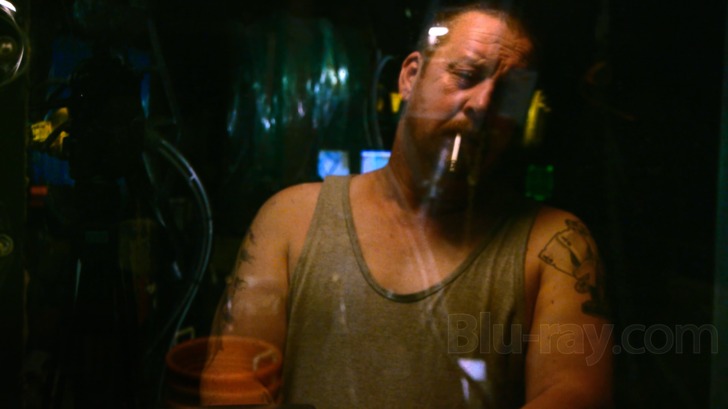
Similarly, the audio capabilities of the GoPro cameras—especially inside their waterproof dive housings—are seriously limited, causing everything to take on a thin, far-away, muffled quality. Sound designers Ernst Karel and Jacob Ribicoff have worked this to the film's favor, however, creating a 5.1 multichannel soundscape—in the lossless DTS-HD Master Audio codec—that's surreal and unsettling. Ghostly chains clank. An electric winch whirs in the distance. The dim underwater thrum of the boat's propellor gives way to ocean spray, wind, and the cawing of seagulls when the camera is suddenly pulled up into the open air. It's immersive in a claustrophobic way; it almost sounds like we're snorkeling through the film with water in our ears, even when the camera isn't submerged. That there's no music—and no intelligible voices—furthers the isolating effect. No subtitles are included, and none are needed.
Leviathan Blu-ray Movie, Special Features and Extras 
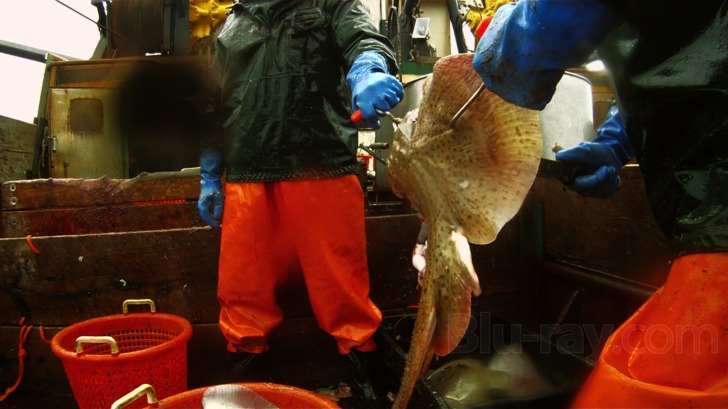
- Still Life/Nature Morte (HD, 28:53): An uninterrupted, nearly half an hour shot of the ship's galley and two fishermen sitting in it, watching television and shooting the breeze, their voices unintelligible. I get it—this is a window into the tedium of the men's downtime, immersing us in their experience—but I honestly couldn't make it through the whole thing without fast-forwarding. Maybe that's the point?
- Trailer (HD, 2:30)
- Cinema Guild (HD): A gallery of trailers for additional Cinema Guild releases.
- Booklet: Inside the case you'll find an excellent essay from French critic Cyril Neyrat.
Leviathan Blu-ray Movie, Overall Score and Recommendation 
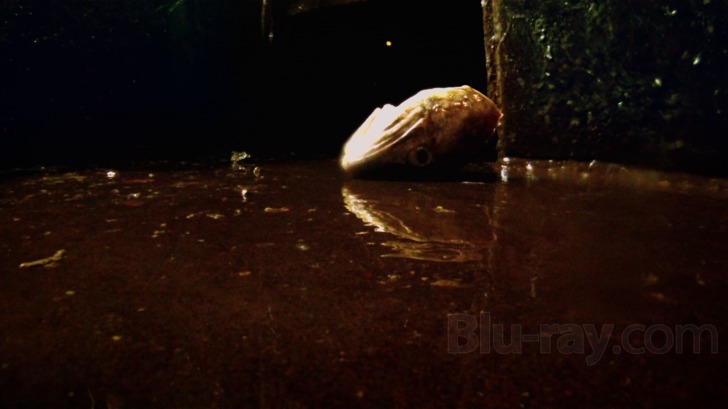
Leviathan is less of a documentary than a subjective, pure cinema experience, turning the activities aboard a commercial fishing vessel into a grim poetry of abstractions that can be interpreted—or better yet, felt—in any number of ways. It's isolating, at turns horrific and hypnotic, and it has the devastating effect of stripping away the privilege that we, as humans, assume we have over the rest of the natural world, leaving us adrift in the uncaring ocean of the universe. Understandably, this is no light Saturday evening entertainment, and it does require a certain patience and mindfulness to appreciate. That is to say, Leviathan is no Deadliest Catch. Highly recommended for those who enjoy the more experimental side of the documentary spectrum.
Similar titles
Similar titles you might also like

Nosferatu the Vampyre
Nosferatu: Phantom der Nacht
1979

Dawson City: Frozen Time
2016

The Creeping Garden
Limited Edition
2014

Monkey Business
1931

Klondike Annie
1936

Faces Places
Visages villages
2017

Lost Soul: The Doomed Journey of Richard Stanley's Island of Dr. Moreau
House of Pain Edition
2014

Champagne
1928

The Beaches of Agnès
Les plages d'Agnès
2008

Cuadecuc, Vampir
1971

Encounters at the End of the World
2007

Triangle of Sadness 4K
2022

All at Sea
Barnacle Bill
1957

Divine Horsemen: The Living Gods of Haiti
1985

Women Make Film: A New Road Movie Through Cinema
2018

Streetwise
1984

Killer Crocodile 2
1990

Oceans
Disneynature
2009

Tongues Untied
1989

Around the World with Orson Welles
1955